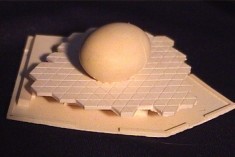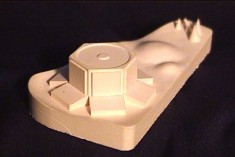|
I'm a bona fide, die-hard model nut.
Sitting in a box in my basement is the beginnings of the '64
World's Fair constructed entirely out of paper! Well, not so
impressive ... there's only a few pavilions completed. I jokingly
refer to it as my "retirement project." Imagine my
surprise and delight when I was introduced to this World's Fair
legacy find:
"You like these sailor? No! You can't
have them!" So began Mike's email of a few weeks back. Mike
is a fellow 1964/1965 New York World's Fair collector and he
knows of my affinity for models. He knew I'd be interested in
seeing these. There in the attachment to his note were the IBM
and Kodak pavilions from the Fair in miniature. "What the
heck are those?" I wondered aloud. They appeared
to be very tiny models of those famous pavilions, all in white
and quite primitive. None-the-less it was unmistakable what they
were. A quick email exchange followed and I soon learn that these
wonderful little gems belong to Doug.
The original model scans Doug sent
of the IBM (left) and Kodak Pavilions
 |
 |
Meet P. Douglas Siebenaler, the lucky owner
of these World's Fair treasures. He's an architect who can trace
his livelihood back to a childhood interest in architecture and
the Fair. Around 1973 a friend of his father's, who knew of Doug's
interest, was cleaning house and came across these old models
he had saved. Doug believes this gentleman worked directly with
a firm involved in the construction of the Fair. He was a draftsman
with a background in graphic design. The boxes he presented to
Doug contained 100 or more models and pieces of models from the
1964/1965 New York World's Fair!
Doug says "The models, I was told,
were used to lay-out the Fair. They are ivory color, solid and
unpainted. To this day I have been unable to find out what they
were actually used for and if they have any value. These models
look like plastic castings and are at a very small scale -- probably
1/32nd or smaller. Some have very rough unfinished edges at the
base." Doug doubts they were used or displayed due to their
rustic nature.
"Coke and a few others have two types
of castings. Johnson Wax is marked #516 and 516-1. Most of the
other models are also numerically marked. Could these markings
be possible lot designations and/or building locations?"
Doug photographed the models that accompany
this story. To give some idea of size, he included a ruler in
some of the photos. The Bell System Pavilion appears to be only
four inches in length! With that pavilion being one of the largest
at the Fair, the small size of the remainder of the pavilion
models becomes evident.
The big question is naturally "Where
did they come from?" They are much too small and primitive
for the Official Model displayed in the American Express Pavilion
and they are also too small in scale for the Model of the City
of New York, hosted at the City Pavilion. The only other model
that Mike and I know of are the small "travelers" that
were built to be portable to numerous venues that would advertise
the Fair. We sent Doug a scan of one of the traveling models
and asked if he could judge by size comparisons if his models
look like they might have come from something like that. He felt
they were too big for the travelers.
So we posed the question to the astute
members of the www.worldsfaircommunity.org Bulletin Board
and soon found our answer when a detailed photograph of the traveler
model on display at the Queens Museum at Flushing Meadows in
New York was posted. It is indeed a match to Doug's mini-models.
It is believed that the model at the Queens Museum is the only
traveling model still in existance, so Doug's models are indeed
rarer then hen's teeth!
-
Doug's models match
those of the seven miniature traveling models
-
constructed by Lester
Associates to advertise the Fair.
|
© Above
Photos Copyright 2002, Rod Smith
|
I asked Doug the obvious question: "Are
they for sale?" and I got the obvious answer! He did mention
there were duplicates of some and he might be willing to part
with those. But I've urged him to hang on to them. Although,
with the prices of models trading on eBay today, he may be able
to finance a small trip around the world or a 27 room mansion
should he decide to auction them off! Let's hope he saves them
for antiquity. What a wonderful legacy of the Fair.
Here are Doug's mini models of the 1964/1965
New York World's Fair...
|